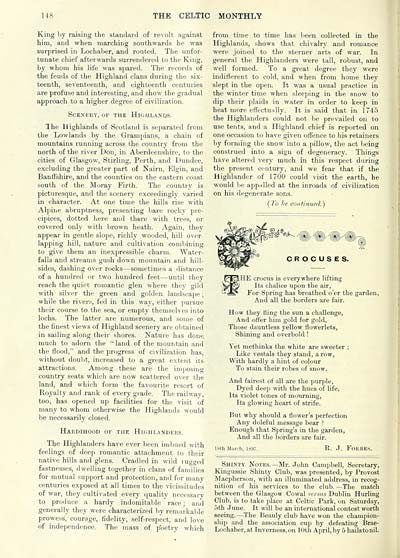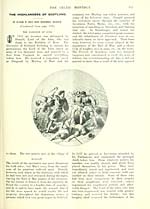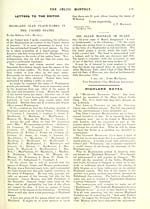Blair Collection > Celtic monthly > Volume 5, 1897
(214)
Download files
Complete book:
Individual page:
Thumbnail gallery: Grid view | List view

148
THE CELTIC MONTHLY
King l)y raising the standard of rexolt against
him, and when marching southwards he was
surprised in Lochaber, and routed. The unfor-
tunate cliief afterwards surrendered to the King,
by whom his life was spared. The records of
the feuds of the Highland clans during the six-
teenth, seventeenth, and eighteenth centuries
are profuse and interesting, and show the gradual
approach to a higher degree of civilization.
Scenery, of the Highlands.
Ihe Highlands of Scotland is .separated from
the Lowlands by the Gramjiians, a chain of
mountains running across the country from the
north of the river Don, in Aberdeenshire, to the
cities of Glasgow, Stirling, Perth, and Dundee,
excluding the greater part of Nairn, Elgin, and
Banftshire, and the counties on the eastern coast
south of the Moray Firth. The country is
picturesque, and the scenery exceedingly varied
in character. At one time the hills rise with
Alpine abruptness, presenting bare rocky pre-
cipices, dotted liere and there with trees, or
covered only with brown heath. Again, they
appear in gentle slope, richly wooded, hill over-
lapping hill, nature and oultivati(m combining
to give them an inexpressible charm. Water-
falls and streams gush down mountain and hill-
sides, dashing over rocks — sometimes a distance
of a hundred or two hundred feet — until they
reach the quiet romantic glen where they gild
with silver the green and golden landscape ;
while the riveni, fed in this way, either jiursue
their course to the .sea, or empty themselves into
lochs. The latter are numerous, and some of
the finest views of Highland scenery are obtained
in sailing along their shores. Nature has done,
much to adorn tlie "land of the mountain and
the Hood," and the progress of civilization has,
without doubt, increased to a great extent its
attractions. Among these are the imposing
country seats which are now scattered over the
land, and which form the favourite resort of
Royalty and rank of every grade. The railway,
too, has opened up facilities for the vi.sit of
many to whom otherwise the Highlands would
be necessarily closed.
Hardihood of the Highlanders.
The Highlanders have ever been imbued with
feelings of deep romantic attachment to their
native hills and glens. Cradled in wild rugged
fastnesses, dwelling together in clans of families
for mutual support and protection, and for many
centuries exposed at all times to the vicissitudes
of war, they cultivated every quality necessary
to produce a hardy indomitable race ; and
generally they were characterized by remarkable
prowess, courage, fidelity, self-respect, and love
of independence. The mass of poetry which
from time to time has been collected in the
Highlands, shows that chivalry and romance
were joined to the sterner arts of war. In
general the Highlanders were tall, robust, and
well formed. To a great degree they were
inditterent to cold, and when from home they
slept in the open. It was a usual practice in
the winter time when sleeping in the snow to
dip their plaids in water in order to keep in
heat more eft'ectually. It is said that in 1745
the Highlanders could not be prevailed on to
use tent.s, and a Highland chief is reported on
one occasion to have given offence to his retainers
by forming the snow into a pillow, the act being
construed into a sign of degeneracy. Things
have altered very much in this respect daring
the present century, and we fear that if the
Highlander of 1700 could visit the earth, he
would be appalled at the inroads of civilization
on his degenerate sons.
{To he contimied.)
|p-|dl.HE crocus is everywhere lifting
W^l Its chalice upon the air,
'^=^ For Spring has breathed o'er the garden.
And all the borders are fair.
How they tiing the sun a challenge,
And oti'er him gold for gold.
Those dauntless yellow tiowerlets,
Shining and overbold 1
Yet methinks the white are sweeter ;
Like vestals they stand, a row,
With hardly a hint of colour
To stain their robes of snow.
And fairest of all are the purple,
Dyed deep with the hues of life.
Its violet tones of mourning.
Its glowing heart of strife.
But why should a flower's perfection
Any doleful message bear I
Enough that Spring's in the garden.
And all the borders are fair.
ISth Mari-h, 1S!)7.
R. J. FOKBES.
Shinty Notes.— Mr. John Campbell, Secretary,
Kingussie Shinty Club, was presented, by Provost
Macpherson, with an illuminated address, in recog-
nition of his services to the club. —The match
between the Glasgow Cowal rersitx Dublin Hurling
Club, is to take place at Celtic Park, on Saturday,
5th June. It will be an international contest worth
seeing. — The Beauly club have won the champion-
ship and the association cup by defeating Brae-
Lochaber.at Inverness, on 10th April, by 5 hails to nil.
THE CELTIC MONTHLY
King l)y raising the standard of rexolt against
him, and when marching southwards he was
surprised in Lochaber, and routed. The unfor-
tunate cliief afterwards surrendered to the King,
by whom his life was spared. The records of
the feuds of the Highland clans during the six-
teenth, seventeenth, and eighteenth centuries
are profuse and interesting, and show the gradual
approach to a higher degree of civilization.
Scenery, of the Highlands.
Ihe Highlands of Scotland is .separated from
the Lowlands by the Gramjiians, a chain of
mountains running across the country from the
north of the river Don, in Aberdeenshire, to the
cities of Glasgow, Stirling, Perth, and Dundee,
excluding the greater part of Nairn, Elgin, and
Banftshire, and the counties on the eastern coast
south of the Moray Firth. The country is
picturesque, and the scenery exceedingly varied
in character. At one time the hills rise with
Alpine abruptness, presenting bare rocky pre-
cipices, dotted liere and there with trees, or
covered only with brown heath. Again, they
appear in gentle slope, richly wooded, hill over-
lapping hill, nature and oultivati(m combining
to give them an inexpressible charm. Water-
falls and streams gush down mountain and hill-
sides, dashing over rocks — sometimes a distance
of a hundred or two hundred feet — until they
reach the quiet romantic glen where they gild
with silver the green and golden landscape ;
while the riveni, fed in this way, either jiursue
their course to the .sea, or empty themselves into
lochs. The latter are numerous, and some of
the finest views of Highland scenery are obtained
in sailing along their shores. Nature has done,
much to adorn tlie "land of the mountain and
the Hood," and the progress of civilization has,
without doubt, increased to a great extent its
attractions. Among these are the imposing
country seats which are now scattered over the
land, and which form the favourite resort of
Royalty and rank of every grade. The railway,
too, has opened up facilities for the vi.sit of
many to whom otherwise the Highlands would
be necessarily closed.
Hardihood of the Highlanders.
The Highlanders have ever been imbued with
feelings of deep romantic attachment to their
native hills and glens. Cradled in wild rugged
fastnesses, dwelling together in clans of families
for mutual support and protection, and for many
centuries exposed at all times to the vicissitudes
of war, they cultivated every quality necessary
to produce a hardy indomitable race ; and
generally they were characterized by remarkable
prowess, courage, fidelity, self-respect, and love
of independence. The mass of poetry which
from time to time has been collected in the
Highlands, shows that chivalry and romance
were joined to the sterner arts of war. In
general the Highlanders were tall, robust, and
well formed. To a great degree they were
inditterent to cold, and when from home they
slept in the open. It was a usual practice in
the winter time when sleeping in the snow to
dip their plaids in water in order to keep in
heat more eft'ectually. It is said that in 1745
the Highlanders could not be prevailed on to
use tent.s, and a Highland chief is reported on
one occasion to have given offence to his retainers
by forming the snow into a pillow, the act being
construed into a sign of degeneracy. Things
have altered very much in this respect daring
the present century, and we fear that if the
Highlander of 1700 could visit the earth, he
would be appalled at the inroads of civilization
on his degenerate sons.
{To he contimied.)
|p-|dl.HE crocus is everywhere lifting
W^l Its chalice upon the air,
'^=^ For Spring has breathed o'er the garden.
And all the borders are fair.
How they tiing the sun a challenge,
And oti'er him gold for gold.
Those dauntless yellow tiowerlets,
Shining and overbold 1
Yet methinks the white are sweeter ;
Like vestals they stand, a row,
With hardly a hint of colour
To stain their robes of snow.
And fairest of all are the purple,
Dyed deep with the hues of life.
Its violet tones of mourning.
Its glowing heart of strife.
But why should a flower's perfection
Any doleful message bear I
Enough that Spring's in the garden.
And all the borders are fair.
ISth Mari-h, 1S!)7.
R. J. FOKBES.
Shinty Notes.— Mr. John Campbell, Secretary,
Kingussie Shinty Club, was presented, by Provost
Macpherson, with an illuminated address, in recog-
nition of his services to the club. —The match
between the Glasgow Cowal rersitx Dublin Hurling
Club, is to take place at Celtic Park, on Saturday,
5th June. It will be an international contest worth
seeing. — The Beauly club have won the champion-
ship and the association cup by defeating Brae-
Lochaber.at Inverness, on 10th April, by 5 hails to nil.
Set display mode to: Large image | Transcription
Images and transcriptions on this page, including medium image downloads, may be used under the Creative Commons Attribution 4.0 International Licence unless otherwise stated. ![]()
| Early Gaelic Book Collections > Blair Collection > Celtic monthly > Volume 5, 1897 > (214) |
|---|
| Permanent URL | https://digital.nls.uk/75853348 |
|---|
| Shelfmark | Blair.57 |
|---|---|
| Additional NLS resources: | |
| Attribution and copyright: |
|
| Description | A selection of books from a collection of more than 500 titles, mostly on religious and literary topics. Also includes some material dealing with other Celtic languages and societies. Collection created towards the end of the 19th century by Lady Evelyn Stewart Murray. |
|---|
| Description | Selected items from five 'Special and Named Printed Collections'. Includes books in Gaelic and other Celtic languages, works about the Gaels, their languages, literature, culture and history. |
|---|

